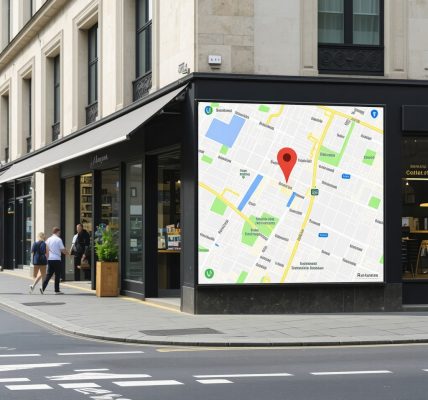Understanding Google Maps SEO for Small Businesses
In today’s digital landscape, local businesses must harness the power of Google Maps to enhance their online visibility and attract more customers. Google Maps SEO strategies are essential for small businesses aiming to rank higher in local search results, making it easier for potential customers to discover their services. This article will delve into the top strategies that can significantly impact your Google Maps ranking, ensuring your business stands out in a competitive market.
Claim and Optimize Your Google Business Profile
The first step in implementing effective Google Maps SEO strategies is to claim and optimize your Google Business Profile. This free tool allows you to manage your business information, including your address, phone number, and operating hours. Make sure to fill out every section of your profile completely, as detailed listings tend to rank higher. Additionally, use relevant keywords in your business description to make it easier for users to find you when searching for services related to your business.
Utilize Local Keywords for Enhanced Visibility
Incorporating local keywords into your Google Business Profile and website content is crucial for improving your local search rankings. Research keywords that are relevant to your business and location, and naturally integrate them into your profile, posts, and website content. For instance, if you own a bakery in Austin, you might use phrases like “Austin bakery” or “best pastries in Austin”. By targeting these local keywords, you can enhance your visibility to customers searching for your services nearby. For more insights on keyword strategies, check out our article on GMB Keyword Research Secrets for Local Search Dominance.
Encourage Customer Reviews and Engagement
Customer reviews play a significant role in local SEO. Positive reviews not only enhance your reputation but also influence your ranking on Google Maps. Encourage satisfied customers to leave reviews by providing excellent service and following up with a request for feedback. Additionally, respond to all reviews, whether positive or negative, as this shows potential customers that you value their input. For best practices on managing reviews, explore our guide on GMB Review Generation Best Practices.
Leverage GMB Posts for Increased Engagement
Utilizing Google My Business (GMB) posts can significantly enhance your engagement levels. Regularly update your profile with posts about promotions, events, or new products. This not only keeps your customers informed but also signals to Google that your business is active, which can positively impact your rankings. To learn how to maximize your GMB posts for SEO impact, check out our article on How to Use GMB Posts for Effective Local SEO Growth.
Optimize for Mobile Users
With the increasing use of mobile devices, optimizing your Google Maps SEO strategy for mobile users is crucial. Ensure your website is mobile-friendly, as Google prioritizes mobile-responsive sites in its rankings. Fast loading times, easy navigation, and clear contact information can significantly enhance the user experience, leading to higher engagement rates and improved rankings. For tips on optimizing your Google Maps listing for better performance, visit 5 Steps to Optimize Google Maps Listing Effectively.
Implementing Effective Local Link Building
Local link building is a pivotal aspect of enhancing your Google Maps SEO. Securing backlinks from local websites, such as community blogs, news outlets, or local business directories, can significantly boost your online authority. These links not only drive referral traffic but also signal to Google that your business is a trusted resource within the local community. For a comprehensive understanding of citation management, explore our article on Proven GMB Citation Management Techniques for Success.
Utilize High-Quality Photos and Videos
Visual content is vital for engaging potential customers and enhancing your Google Maps listing. High-quality photos and videos of your business, products, or services can captivate visitors and encourage them to choose your business over competitors. Regularly update your media to reflect any changes or new offerings. Additionally, ensure that your images are optimized for size and format to improve load speeds on mobile devices. For tips on photo optimization, refer to our guide on Best GMB Photo Optimization Tips for Enhanced Engagement.
Engage with Local Social Media Communities
Social media is a powerful tool for local businesses aiming to enhance their visibility. Engaging with local community groups on platforms like Facebook or Instagram can help drive traffic to your Google Business Profile. Share your GMB posts across social media channels to reach a broader audience. Additionally, consider running local promotions or contests that encourage sharing your business among community members. This strategy not only increases your visibility but also fosters a sense of community around your brand.
Monitor and Analyze Your GMB Insights
Understanding how customers interact with your Google Business Profile is crucial for refining your SEO strategies. GMB Insights provides valuable data on how customers find your listing, what actions they take, and their demographic information. By regularly analyzing this data, you can identify trends and adjust your content and engagement strategies accordingly. To learn more about leveraging GMB Insights for better local rankings, visit our article on How to Use GMB Insights for Better Local Rankings in 2025.
Optimize Your Business Description
Your business description is a prime opportunity to showcase what makes your business unique. This section should include essential keywords that reflect your services and location. Make it informative yet engaging to attract potential customers. Remember to keep it concise and focus on the value you offer. Updating your business description regularly to reflect new services or changes can also positively influence your ranking. For a detailed checklist on optimizing your business profile effectively, check out our resource on Essential Google Business SEO Checklist for Local Impact.
Stay Updated with Google’s Guidelines
Google frequently updates its algorithms and guidelines, which can affect your local SEO strategies. Staying informed about these changes is critical for maintaining your rankings. Regularly review Google’s guidelines for local businesses to ensure compliance and adapt your strategies accordingly. For further insights into effective local SEO practices, explore our article on The Secrets to Effective Local SEO for Small Businesses. Keeping your tactics aligned with Google’s best practices will enhance your chances of achieving and maintaining high rankings.
Utilizing Local SEO Techniques to Improve Google Maps Visibility
Incorporating local SEO techniques is integral to enhancing your Google Maps visibility. Ensuring that your website and Google Business Profile are optimized for local searches can make a significant difference in attracting nearby customers. This involves not only the use of local keywords but also ensuring that your NAP (Name, Address, Phone Number) information is consistent across all online platforms. Consistency in your NAP details reinforces trust with search engines, improving your chances of ranking higher in local search results. For a deep dive into local SEO practices, consider visiting our post on Understanding Local SEO for Small Businesses.
Implementing Structured Data for Enhanced Listings
Using structured data markup (schema) can further enhance your Google Maps SEO. Structured data helps search engines understand your content better, which can lead to improved visibility in search results. By implementing schema for your business type, location, and service offerings, you provide search engines with valuable context. This can lead to rich snippets, which can make your listing stand out. To explore how structured data can benefit your business, check out our article on Essential Techniques for Google Business Optimization.
Engaging with Customers Through Google Q&A
Another noteworthy feature of Google Business Profiles is the Q&A section, where potential customers can ask questions about your business. Actively engaging in this section by providing timely and informative answers can enhance customer trust and influence their decision-making process. Setting up alerts for new questions ensures you don’t miss any inquiries and can respond promptly. This engagement not only fosters a positive customer relationship but also signals to Google that your business is active and responsive.
Utilizing Insights for Continuous Improvement
Regularly analyzing your Google My Business Insights is vital for understanding how customers interact with your listing. Insights provide data on how customers find your business, what actions they take, and which queries lead them to your profile. By examining this data, you can adjust your strategies to enhance your visibility and engagement. For a comprehensive approach to using GMB Insights effectively, refer to our guide on How to Use GMB Insights for Better Local Rankings in 2025.
Participating in Local Events and Sponsorships
Building connections within your community through local events or sponsorships can significantly enhance your visibility. Participating in community events not only showcases your business but also provides opportunities for local backlinks, which are essential for improving your SEO standing. Additionally, promoting your involvement through your Google Business Profile and social media channels can attract local customers who value community engagement. To learn about the benefits of local sponsorships and events, check out our article on Fast Track Your Google Business Traffic Using GMB Tools.
Optimizing Your Google Business Profile for Voice Search
With the rise of voice search, optimizing your Google Business Profile for voice queries is becoming increasingly important. People tend to use conversational phrases when searching through voice assistants, so adapting your listing to reflect these natural language patterns can boost your chances of being discovered. Include common questions and answers that potential customers might ask in your profile description and posts. For more insights on optimizing for voice search, visit our post on How to Use Google Maps to Drive Local Business Traffic.
Enhancing Your Google Maps SEO with Local Engagement
Engaging with your local community is an essential aspect of improving your Google Maps SEO. Building relationships and fostering connections can lead to increased brand visibility and loyalty among local customers. In this section, we will explore various strategies to enhance your local engagement and how it can positively impact your search rankings.
Establishing Partnerships with Local Organizations
Collaborating with local organizations, such as nonprofits, schools, or community groups, can provide valuable opportunities for your business. By sponsoring local events or participating in community initiatives, you can generate goodwill while also earning backlinks from reputable local websites. These backlinks are crucial for boosting your local SEO efforts.
Utilizing Google Q&A for Customer Interaction
As mentioned earlier, the Q&A section of your Google Business Profile is a fantastic way to engage with potential customers. By proactively answering questions about your services, products, or business hours, you not only provide essential information but also enhance customer trust. Regularly monitoring this section ensures you stay responsive and can address any concerns promptly. This engagement signals to Google that your business is active, which can positively affect your ranking.
Creating Local Content for Your Audience
Content creation tailored to your local audience can significantly improve your Google Maps visibility. Consider writing blog posts or creating videos that highlight local events, collaborations, or community news. Not only does this establish your business as a local authority, but it also encourages local backlinks and shares on social media. For tips on content strategies, check out our post on Effective GMB Ranking Strategies to Elevate Your Business.
Leveraging Local Events for SEO Benefits
Participating in local events can significantly enhance your business’s visibility. Whether it’s a trade show, community fair, or local festival, these events provide an excellent platform for networking and promoting your business. Make sure to showcase your Google Business Profile at these events, encouraging attendees to leave reviews or follow your updates. This can lead to increased engagement and enhanced local SEO.
Running Local Promotions and Contests
Local promotions or contests can create buzz around your business, drawing in new customers while rewarding loyal ones. Consider running a contest where participants must follow your Google Business Profile or share your posts to enter. This not only boosts engagement but also improves your online presence. For more strategies on customer engagement, read our article about GMB Engagement Strategies for Building Customer Trust.
Monitoring Online Reputation and Feedback
Your online reputation plays a vital role in your Google Maps SEO. Regularly monitoring customer feedback across various platforms allows you to address any negative reviews swiftly. Responding to feedback demonstrates your commitment to customer satisfaction and encourages more patrons to leave positive reviews. For guidance on managing your reputation, refer to our post on How to Leverage Customer Reviews for Better GMB Rankings.
Conclusion
Enhancing your Google Maps SEO involves more than just optimizing your profile and using local keywords; it requires active engagement with your community and customers. By implementing these strategies, including local partnerships, creating tailored content, and participating in community events, you can significantly improve your online visibility. As you continue to refine your approach, remember to monitor your progress and adapt as needed to stay ahead in your local SEO efforts.
Frequently Asked Questions (FAQ) about Google Maps SEO
1. What is Google Maps SEO and why is it important for small businesses?
Google Maps SEO refers to the strategies and techniques used to optimize your Google Business Profile and overall online presence to improve visibility in local search results on Google Maps. It is essential for small businesses as it helps attract local customers, increases foot traffic, and enhances online reputation.
2. How can I optimize my Google Business Profile for better rankings?
To optimize your Google Business Profile, ensure that all information is accurate and complete. Use relevant keywords in your business description, add high-quality images, encourage customer reviews, and regularly post updates about promotions or events to engage your audience.
3. What role do customer reviews play in Google Maps SEO?
Customer reviews are crucial for Google Maps SEO as they influence your business’s credibility and ranking. Positive reviews enhance your reputation and can improve your visibility in search results. Actively encouraging reviews and responding to them can significantly impact your local SEO efforts.
4. How important are local keywords in my Google Maps SEO strategy?
Local keywords are vital for targeting customers in your area. Incorporating these keywords throughout your Google Business Profile and website content helps improve your chances of appearing in local search results, making it easier for potential customers to find your business.
5. Can social media engagement affect my Google Maps SEO?
Yes, engaging with your local community on social media can positively affect your Google Maps SEO. Sharing posts from your Google Business Profile and participating in local online communities can drive traffic to your profile, leading to increased visibility and potential customer interactions.
6. How can I track the effectiveness of my Google Maps SEO efforts?
You can track the effectiveness of your Google Maps SEO efforts by using Google My Business Insights. This tool provides valuable data on how customers find your listing, what actions they take, and demographic information, allowing you to refine your strategies based on real data.
7. What are some common mistakes to avoid in Google Maps SEO?
Common mistakes in Google Maps SEO include neglecting to update your Google Business Profile, failing to respond to reviews, using inconsistent NAP information, and not utilizing local keywords effectively. Avoiding these pitfalls can help maintain a strong online presence.
8. How can structured data markup help my Google Maps SEO?
Structured data markup, or schema, helps search engines better understand your business information, which can enhance your visibility in search results. Implementing schema related to your business type, location, and services can lead to rich snippets that make your listing more appealing.
9. Is it necessary to have a mobile-friendly website for Google Maps SEO?
Yes, having a mobile-friendly website is crucial for Google Maps SEO. Google prioritizes mobile-responsive sites in its rankings, and a positive mobile experience can lead to higher engagement rates, improving your overall local search visibility.
10. How often should I update my Google Business Profile?
You should update your Google Business Profile regularly to keep it accurate and relevant. Frequent updates about new products, services, promotions, or events signal to Google that your business is active, which can positively impact your rankings.
Authority Resources for Google Maps SEO
For further reading and to deepen your understanding of Google Maps SEO, consider exploring the following trusted resources:
- Moz – Offers extensive resources and guides on local SEO and Google My Business optimization.
- Search Engine Land – A leading publication that covers the latest trends and strategies in search marketing, including local SEO.
- Neil Patel – Provides valuable insights and tactics for improving SEO, including local search strategies.
- Search Engine Journal – Features articles and guides on SEO best practices, including Google Maps optimization.
- BrightLocal – Specializes in local SEO tools and resources, helping businesses improve their local search performance.
Conclusion
In conclusion, mastering Google Maps SEO is essential for small businesses seeking to enhance their online visibility and attract local customers. By implementing effective strategies such as optimizing your Google Business Profile, utilizing local keywords, engaging with customers, and leveraging community involvement, you can significantly improve your rankings in local search results. Remember to monitor your progress and stay updated with best practices to maintain a competitive edge in the ever-evolving digital landscape.




This article touches on some crucial aspects of Google Maps SEO! I run a small coffee shop in Seattle, and I’ve found that optimizing my Google Business Profile really made a difference in attracting more foot traffic. I’ve started using local keywords like ‘Seattle coffee’ and ‘best lattes in Seattle’ in my profile, which has definitely improved my visibility.
Additionally, encouraging my customers to leave reviews has not only boosted my ranking, but it has also created a strong community vibe around my shop. Just yesterday, a local foodie blog posted about my coffee shop, and the backlinks helped tremendously! I can’t stress enough the importance of connection with local organizations, as it has led to fruitful partnerships and promotions.
I also appreciate the emphasis on mobile optimization. Many of my customers find us while on the go, so ensuring a smooth mobile experience has always been a priority for me. I would love to hear more about your suggestions on utilizing Instagram and Facebook for local community engagement in tandem with these strategies!